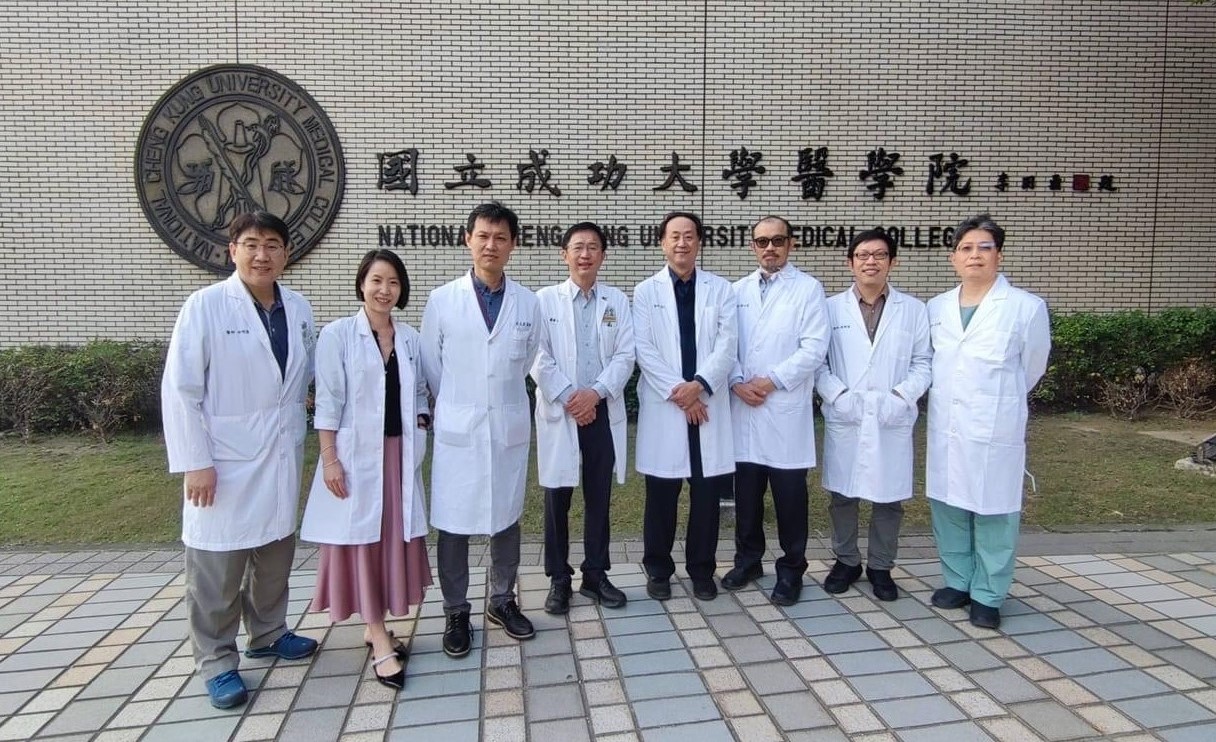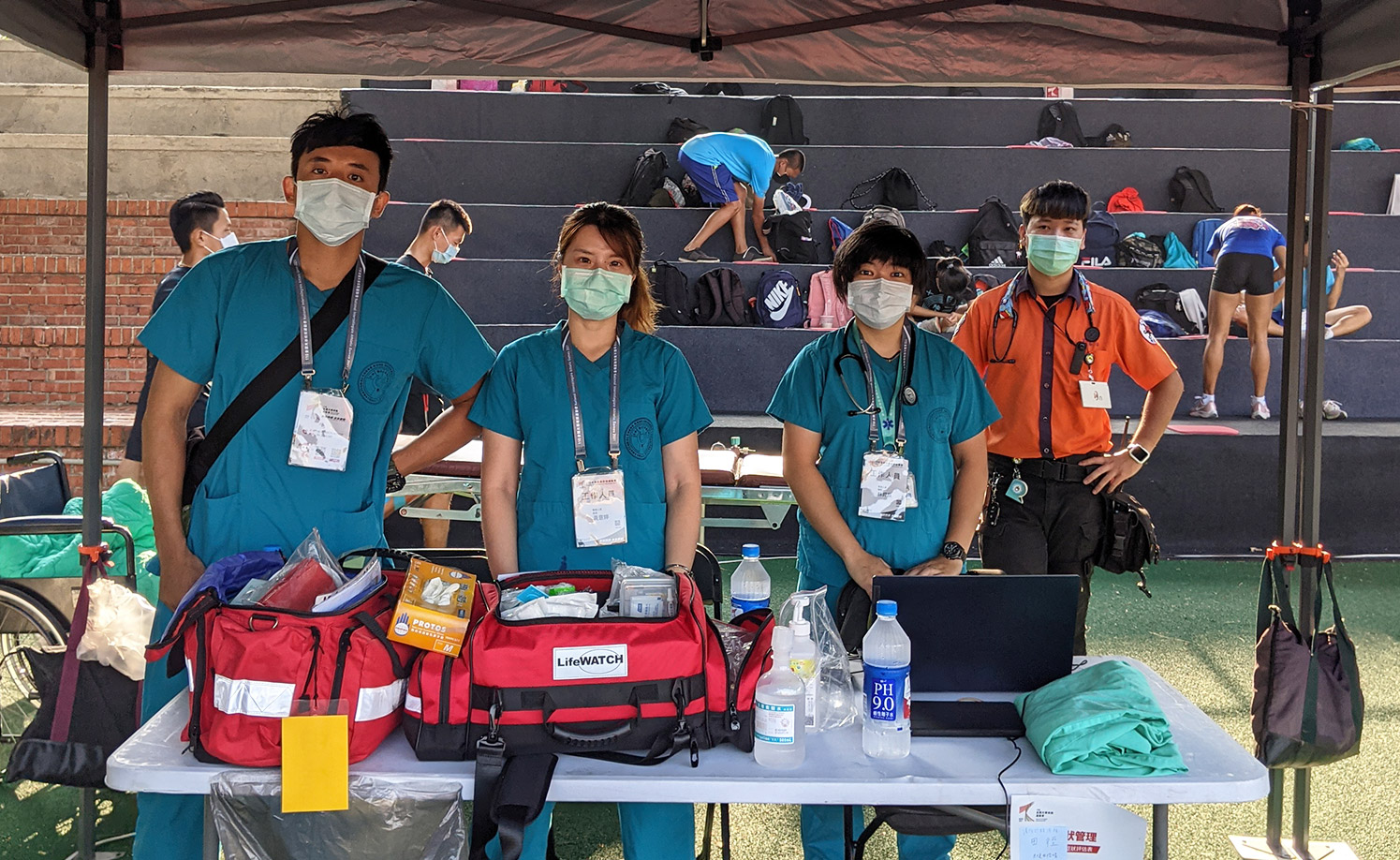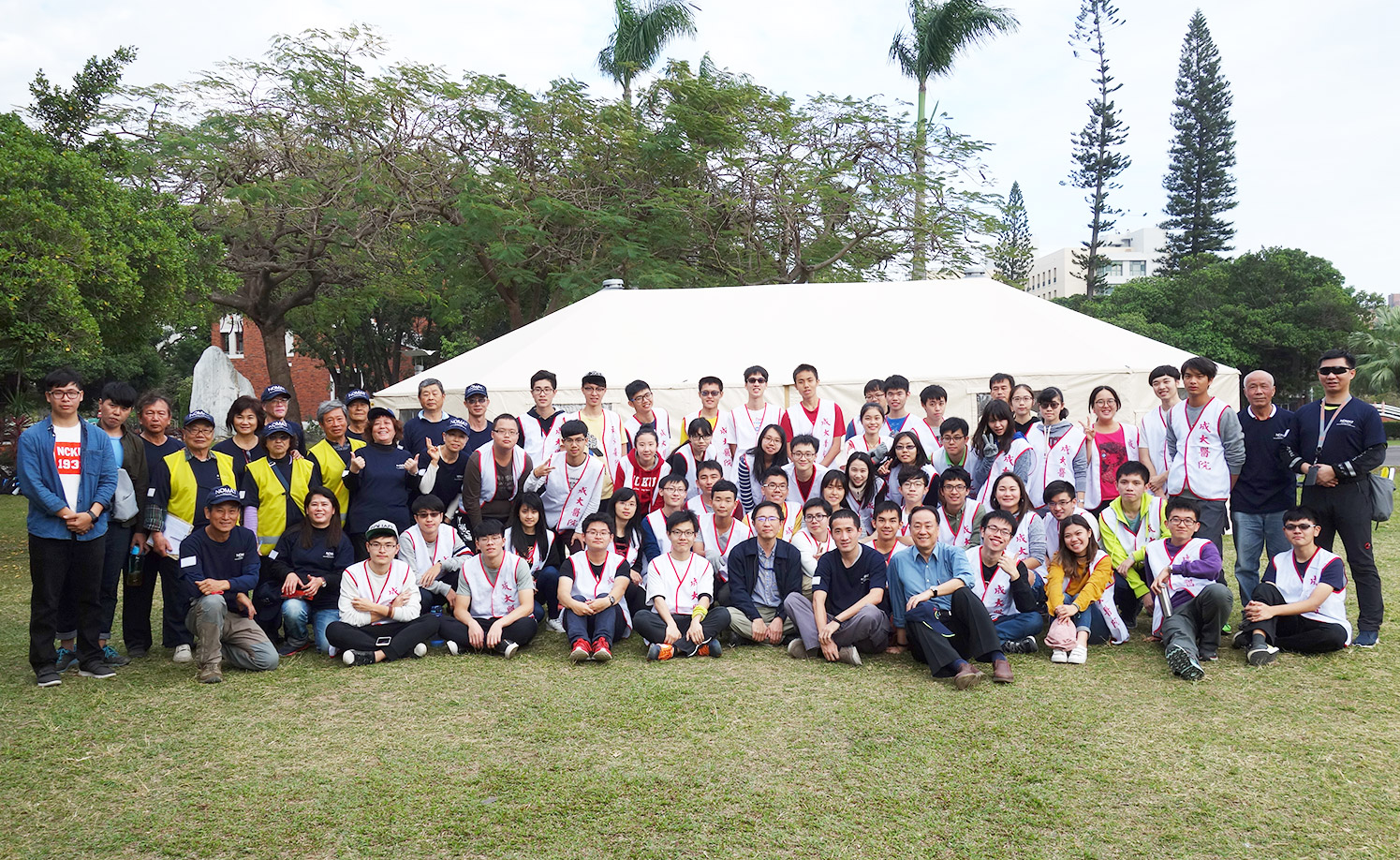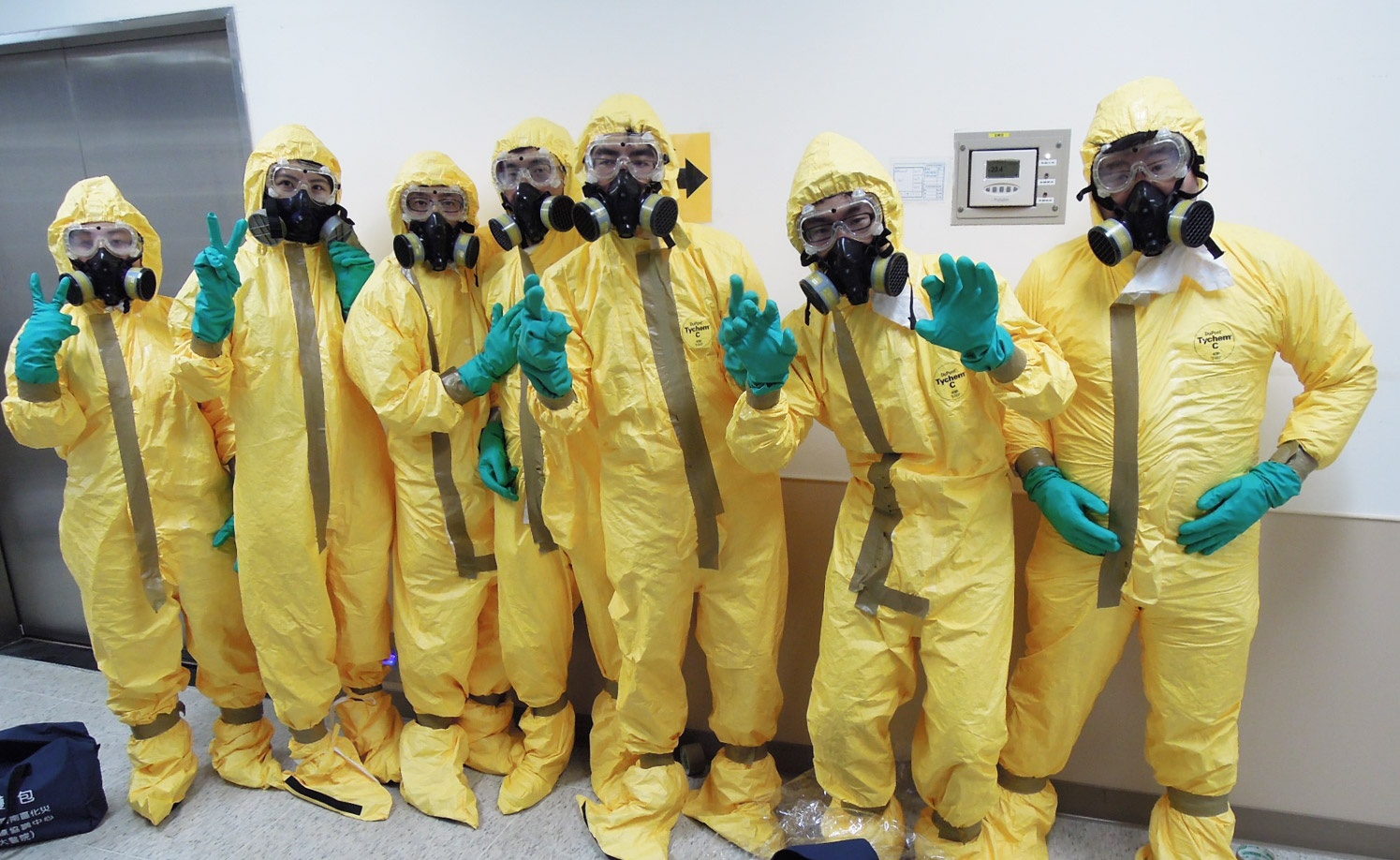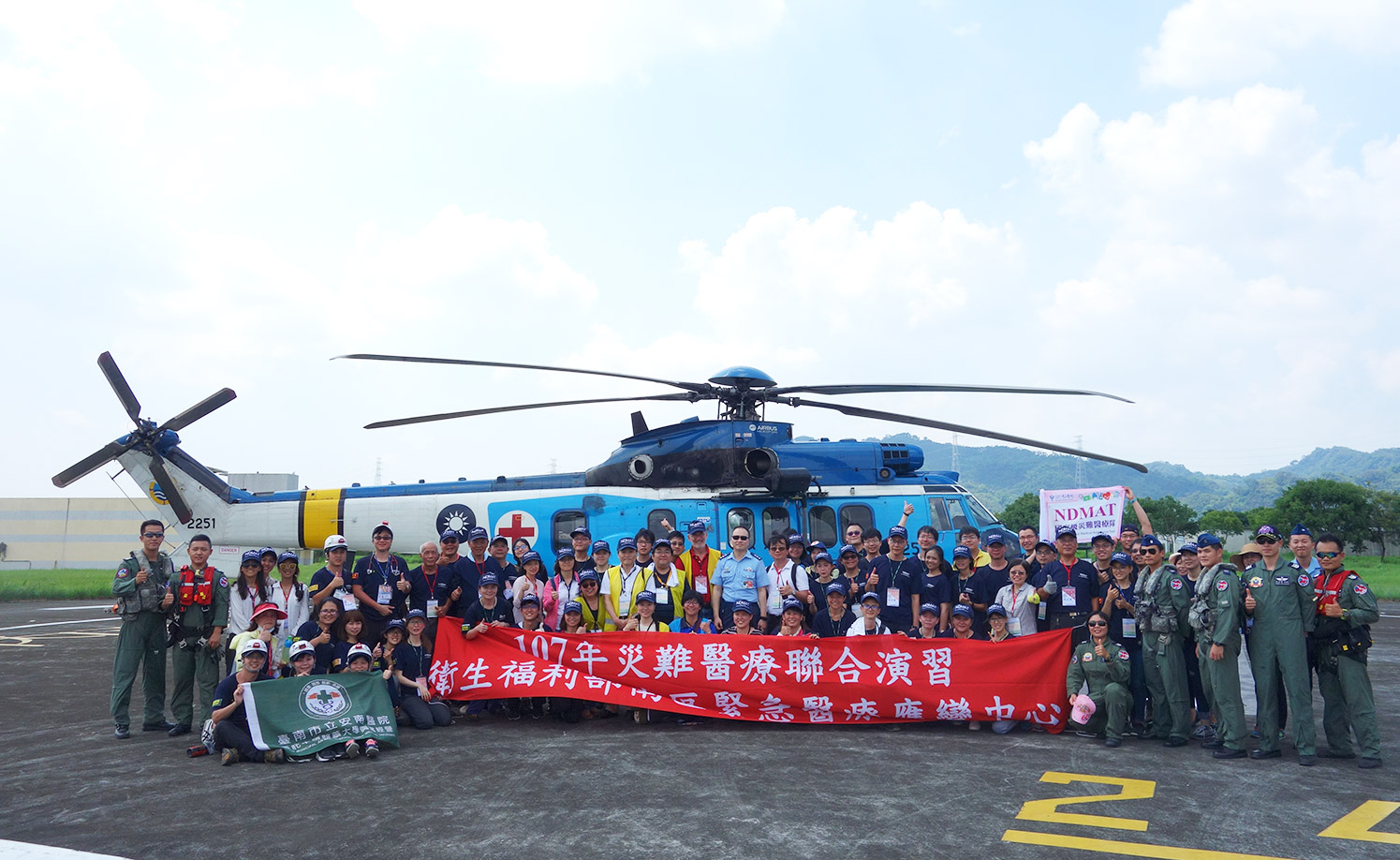Training Program
1. Introduction
The Department of Emergency Medicine of National Cheng Kung University School of Medicine Affiliated Hospital was established in 1988. Since 1990, a full-time attending physician has been in charge of medical business. Since 1991, it has recruited residents to receive emergency specialist training. , Women, children and eye, ENT, dental joint clinic, can provide emergency 24-hour medical care for patients with 75 beds.
History
At present, the average number of emergency department visits is more than 7,000 per month, and a strong lineup of emergency specialist attending physicians is personally responsible for the first-line medical work. The hospital is an intensive care hospital for emergency injuries and patients in the southern region of Yunnan, and has long-term performance in assisting and training emergency medical personnel. Current positioning: Southern National Medical Center, Emergency Medicine Research Center, Emergency Specialist Education and Training Hospital, Severe Evacuation Hospital in Southern Yunnan.
2. The purpose
is to cultivate excellent emergency specialist physicians with six core competencies, patient-centered, clinical service, research and teaching.
3. Aim to
improve the six core competencies of resident physicians, including:
(1) Patient Care
Learning to make appropriate decisions based on patient wishes, the latest evidence-based medicine and clinical judgment, and consultation and consultation with patients and their families. Guardianship.
(2) Medical knowledge:
Learn about diagnosis and treatment of various acute and critical illnesses, professional knowledge related to pre-hospital rescue, response to a large number of injuries or special disasters, and professional knowledge of emergency-related subspecialties.
(3) Practice-based learning and improvement in clinical work
1. Learn about academic evaluation and research methods related to emergency medicine.
2. Able to examine the condition of patient care, draw scientific evidence, and self-learn to improve the medical behavior of caring for patients.
3. Apply what you have learned and promote emergency medicine education and training.
(4) Interpersonal and communication skills (Interpersonal and communication skills)
1. Learn to establish appropriate medical relationships with patients and their families, cooperate and coordinate with the medical team within the department, be able to consult other specialties in a timely manner, and effectively and cross-departmentally. Medical colleagues communicate and perform medical care.
2. Learn about the administrative operations and leadership of the emergency medicine department.
3. Be able to take into account multiculturalism, properly communicate with patients and their families, and reduce complaints and conflicts between doctors and patients.
(5) Professionalism (Professionalism)
1. Learn medical behaviors in line with medical ethics, perform professional responsibilities, and be sensitive to special patient groups.
2. Be able to manage self-spirit and time, and achieve balance between work and life to reduce work boredom or exhaustion.
(6) Clinical work under the system (system-based practice)
1. Understand the current medical system and social environment, properly use relevant resources, and implement cost-effective medical care and resource allocation without sacrificing medical quality.
2. Be able to integrate the health care system, and implement the national health care development trend learning assessment and prevention of medical disputes.
4. Selection of teachers and trainees
1. The host is an emergency specialist with more than eight years of experience, and has the qualifications of a medical policy association or emergency medicine association teacher. The moderator's clinical work hours must be less than 132 hours per month.
2. The moderator shall be responsible for supervising teachers and other staff of the discipline, and participating in the formulation of the school-wide teaching system norms.
3. The moderator shall supervise the adequacy of the number of cases and disease types of the resident physicians throughout the course of study. In addition, the host must provide resident physician counseling for emotional or mental stress, drug addiction or alcohol addiction and negative warning signs; when necessary, refer the instructor to follow up on individual counseling or arrange referral to the hospital staff care team for professional counseling.
4. There is a medical education group in the department, which meets every two months to evaluate the teaching effect. The members must include the moderator and at least one resident representative. Before the end of each year, review the appropriateness of training assessments in various disciplines (including emergency teaching, eye and ENT, imaging medicine, emergency medical and disaster medicine, pediatric emergency, and critical care) with representatives of other training medical units.
5. The Division will hold at least one teacher seminar every year before the end of October to discuss issues related to teacher training and enhance teachers' new knowledge in teaching.
6. The selection of resident physicians is in accordance with the regulations of the hospital. The selection content will be published on the website of the hospital or the website of the emergency department in advance. At least three selection committees are responsible for each time, and one of them must be the moderator.
5. Duration According to
the "Benchmark of Emergency Medicine Specialist Training Course", the resident physician training for a single specialty is 3.5 years.
6. Method and content
(1) The main content of emergency department resident physician training follows the "Benchmarks of Emergency Medicine Association Specialist Training Course"
1. Training course content (required time is 3.5 years)
(1) Adult emergency medicine (17 months)
A. Emergency department administration is also covered.
B. Gradually increase the complexity and number of patients treated according to seniority.
C. The average monthly clinical work hours are between 160-200 hours, and each shift does not exceed 12 hours.
(2) Internal Medicine (1 month)
A. Major specialties include: Cardiology, Thoracic Medicine, Gastroenterology, and Nephrology.
B. Minor specialties include: Metabolism, Infectious Diseases, Hematology-Oncology, and General Internal Medicine.
(3) Surgery (2 months)
A. Major specialties include: General Surgery, Orthopedics, Plastic Surgery.
B. Minor specialties include: Neurosurgery, Cardiovascular Surgery, Thoracic Surgery, Burn Center or Hyperbaric Oxygen Center, Urology.
(4) Pediatrics (4 months, including pediatric ward and pediatric emergency medicine)
A. Major specialties include: general pediatrics, pediatric emergency
B. Secondary specialties include: baby room, intensive care unit
(5) Intensive medicine (4 months)
Medical and surgical intensive care unit training (RICU, MICU, CCU, SICU)
(6) Others (total 14 months)
A. Major specialties include: neurology, toxicology, dermatology, obstetrics and gynecology, psychiatry, ENT, Ophthalmology, imaging medicine, ultrasound, disaster medicine and pre-hospital care.
B. Actively participate in the domestic "Emergency Medical Service" (EMS) and be familiar with the operation of the domestic disaster response system.
C. It is recommended to specialize in research or elective subjects
2. Other training activities:
(1) Important lectures (including emergency medical record writing training, professional ethics, communication between doctors and patients, evidence-based medicine, infection control, medical quality and communication between doctors and patients, etc. or lectures) )
(2) Special lecture
(3) Case report
(4) Case discussion (death case discussion, revisit case discussion)
(5) Comprehensive or special ward round or case discussion (such as trauma, radiology, toxicology, etc.)
(6) Teaching of core courses (textbook study, thematic teaching of attending physicians)
(7) Periodical study
(8) Medical simulation training
(9) Ward teaching
(10) Teaching of resident physicians (for interns, nurses, EMT, etc.)
3 . There is a half-month annual vacation every year (if the seniority is less than one year, it will be calculated according to the proportion), please inform the person in charge of the resident physician before the annual training schedule is determined.
4. Each resident physician has an attending physician as his mentor. Tutors should review their learning every three months and review their learning outcomes.
5. Residents are obliged to record their study content and process, and complete the study passport.
6. During the last year of training, serve as the chief resident physician, responsible for various clinical, administrative, teaching and emergency medical network related businesses.
7. All residents should have research experience and at least one original paper or case report. There are research leaders and supervisors in this department who will assist resident physicians in their research.
8. For resident physicians participating in domestic academic conferences and research activities, there is a system of travel fee, registration fee subsidy or incentive system, and the registration fee and travel fee subsidy for the first author of a paper (poster) published in an international academic conference.
9. Resident physicians are required to participate in the teaching and related evaluation of emergency courses for interns and clerks in the department.
(2) Six core competency training methods:
1. Patient care:
(1) Mainly study in clinical work, and the attending physicians are present to supervise and guide residents during their work:
(2) Supplemented by case discussion or journal study and other teaching conferences to improve the ability of empirical medicine and clinical decision-making:
2. Medical knowledge:
(1) According to the training content, go to various specialties to learn relevant medical knowledge
(2) Regularly hold keynote speeches by attending physicians to teach and discuss emergency-related issues
(3) Regular teaching of core courses is held. In addition to direct teaching by teachers, residents are also invited to read books or journals to report and share the content.
3. Learning and improvement in clinical work:
(1) Regularly for dead cases, three-day return cases and special cases Review reports, use evidence-based medicine models in discussions, and improve clinical practice models
(2) Hold evidence-based medicine teaching and journal studies to bring the latest medical technology and treatment guidelines into the clinic
(3) Target residents can learn and improve their clinical work at any time
4. Interpersonal and Communication Skills:
(1) Junior residents learn how to communicate with patients or their families in clinical practice, and inform their illness and health education
(2) Senior residents learn to communicate with medical colleagues step by step and participate in medical quality conferences. Lead the medical team and perform administrative work
(3) Hold a course on doctor-patient relationship from time to time
5. Professional quality:
(1) Teachers at any time in the clinic to supervise whether the clinical work conforms to medical ethics, and professional responsibility
(2) Regularly hold medical ethics and law Discussion Sessions
(3) Mentors or resident leaders regularly discuss with residents and identify burnout early.
6. Clinical work under the system:
(1) Directly learn the use of relevant social resources with teachers, social workers or other medical-related personnel in clinical practice
(2) During rotation training of emergency medical system and disaster medicine, through practical participation to understand the national medical system and emergency Allocation and utilization of medical resources
(3) Hospitals and departments conduct education and publicity on national medical policies from time to time.
(3) Year-by-year resident training plan and stratification of responsibilities
1. First-year resident physician
(1) Adult emergency medicine:
A. Learn the basic concepts of emergency medicine, including how to ask for medical history and physical examinations, and judge commonly used examination results. Evaluate common emergency cases.
B. Under the supervision of the attending physician, learn basic respiratory treatment techniques, initial stabilization of patients with shock, and first aid for patients with cardiac arrest.
C. Learn to put on and take off protective clothing, central venous catheter placement, wound suturing, fracture or dislocation reduction and fixation, cervical spine fixation and cervical collar placement, long back plate removal, puncture and drainage of thoracic or ascites.
D. Must pass the ACLS and ETTC license exams.
(2) Pediatrics:
learn the basic concepts of pediatrics in the pediatric ward, including how to ask medical history and physical examinations, and judge common test results.
(3)
Internal Medicine: General knowledge of internal medicine is learned in the internal medicine ward for systematic evaluation of emergency patients.
(4) Surgery:
learn general knowledge of surgery, postoperative patient care, wound assessment and management skills in the surgical ward.
(5) Obstetrics and Gynecology:
Learn about common gynecological emergencies, sexual assaults, and complications of childbirth or pregnancy in the emergency department or outpatient clinic.
(6) Otolaryngology:
learn common head and neck diseases in the emergency department or outpatient department.
(7) Ophthalmology:
study common eye diseases or traumas in the emergency department or outpatient clinic.
(8)
When the resident physician performs various important clinical examinations or disposals in the first year, the consent form must be signed and sealed by the attending physician at the same time.
2. Second-year residency
(1) Adult emergency medicine:
A. Be able to systematically evaluate and deal with common acute and critical patients, and learn the principles of dealing with patients with major trauma.
B. Learn the principles of first aid treatment after cardiac arrest and recovery, be familiar with the timing and dosage of first aid drugs, and the appropriate time to terminate first aid.
C. Time to learn to apply diagnostic imaging.
D. Learn pigtail placement, chest tube placement, cardiac rectification and defibrillation, focal ultrasound assessment (FAST, etc.) and the use of external pacemakers.
(2) Pediatrics:
A. Learning first aid skills for infants and children
B. Learning common clinical problems of children's emergency and trauma.
C. Must pass APLS certificate.
(3) Surgery:
understand common surgical emergencies, effective wound assessment and treatment skills, and be familiar with the ability to assess common surgical diseases.
(4) Neurology:
A. Learn detailed and accurate neurological examination and evaluation.
B. Correct and immediate application of imaging diagnostic tools to diagnose and treat neurological lesions.
C. At least 3 cases of lumbar puncture have been completed.
(5) Disaster Medicine:
Learn the basic principles of disaster management.
(6) Imaging medicine:
learn the interpretation of common imaging examinations in emergency, such as X-ray or computed tomography.
(7) Critical care medicine:
A. Cultivate rapid diagnosis, treatment and stabilization of critically ill patients.
B. Learn the pathophysiology and treatment associated with critically ill patients.
C. Learn the ability to monitor and manage hemodynamics.
(8)
When the resident physician performs various important clinical examinations or disposals in the second year, the consent form must be signed by the attending physician at the same time.
3. 3rd year residency
(1) Adult Emergency Medicine:
A. Command and coordinate clinical teams to handle critical patients skillfully and quickly.
B. Learn the principles of comprehensive management of acute problems of the elderly.
C. Learn about various environmental emergencies and occupational injuries.
D. Learn esophageal bulb placement (SB tube), aspiration of pericardial effusion and surgical airway.
(2) Pediatric emergency medicine:
Familiar with infant and pediatric emergency skills, and strengthen the basic concepts and treatment procedures of pediatric emergency.
(3) Department of Psychiatry:
A. Learn the use of various common psychotropic drugs in the emergency department.
B. Learn interviewing skills for mentally ill patients.
C. Familiar with the principles and procedures for dealing with violent patients.
D. Practice emergency consultation psychiatry for various indications.
(4) Emergency rescue system:
A. Learn the basic organizational structure of emergency medical rescue before hospitalization, the operation of the rescue system and the principles of medical law.
B. Learn the principles of emergency medical rescue and transport of patients to pre-hospital triage.
C. Understand the educational needs and technical standards of ambulance technicians at all levels.
(5) Ultrasound: Ultrasound
is commonly used in the interpretation and operation of the emergency department.
(6) Toxicology: go
to Beirong Poison Drug Consulting Center for training.
A. Learn the medical history inquiry and physical examination of acute poisoning patients, and be familiar with various poisoning syndromes.
B. Understand the general principles of acute poisoning patients, stabilization of vital signs and decontamination.
C. Understand the timing and indications of various antidotes or special treatments.
D. Learn the principles of poisoning disaster disposal.
(7) Critical care medicine:
strengthen the ability to rapidly stabilize critically ill patients.
(8)
In the third year, a resident physician should have the ability to communicate with patients and their families independently, and learn to serve as a teaching senior for medical students and junior residents.
4. Fourth-year residency
(1) Adult emergency medicine:
A. Learn the basic principles of hospital emergency system leadership and management
B. Act as a clinical teacher to guide trainee medical students or junior residents.
C. Familiar with emergency department functions and relationships with other departments.
D. Pass the AILS and ATLS certificate exams.
(2) Pediatric Emergency Medicine:
Proficiency in clinical problems of pediatric emergency and trauma.
(3)
In the fourth year, residents should actively study and prepare to complete the examinations for various abilities and professional licenses for promotion to emergency attending physicians.
5. Other precautions for emergency medicine training:
(1) When the first and second year resident physicians perform various important clinical examinations or treatments, the consent form must be signed by the attending physician at the same time.
(2) Before a junior resident consults a specialist, he must discuss with the attending physician and then understand the purpose and needs of the consultation. After the consultation, he must discuss the condition of the patient with the consulting physician, or review the consultation reply sheet as soon as possible to decide the follow-up treatment.
(3) After the emergency medical record is completed, the junior resident physician must discuss with the attending physician and review the medical record first, while the senior resident physician must report to the attending physician and complete the medical record review before the patient leaves the emergency department. During case review, the attending physician may revise or supplement the medical record with his signature and seal.
7. Teaching activity
| Date | Time | Location | Teaching activity |
| Every Tuesday | 08:00-09:00 | ED office | Trauma journal seminar |
| Every Wednesday | 08:20-09:20 | Conference room 201 | Death case conference,Return visit within 72 hr discussion, Myocardial Infarction/Severe Sepsis Quality Control Conference, Major Trauma Case Seminar (held on alternately)(with breakfast) |
|
Every second Wednesday |
08:20-12:00 | Conference Room 201 | Residency Training Day |
|
Every fourth Thursday |
12:00-14:00 | ED Office |
Beirong Toxicology Video Conference, Toxicology Case Seminar |
| Every Friday | 08:20-09:20 | Conference Room 201 |
Grand Round/Morning Meeting, Case seminar,Attending Physician's Special Lecture (with breakfast) |
| Twice a day | 8am-9am & 8pm-9pm |
Bedside teaching | Bedside teaching |
Hold medical simulation training courses with acute and severe colleagues every six months
Hold empirical medicine, infection control from time to time , Medical quality, medical record writing and medical communication and other courses
VIII. Assessment and feedback
(1) Resident physician evaluation The assessment
is given to the resident physicians assigned to the training department, and the attending physician of the surgical training department is asked to evaluate.
Semi-annual midterm or final resident training and evaluation are held, including (1) written test, (2) DOPS surgery test, (3) MiniCEX clinical practice test, and (4) six core competency evaluations. The assessment results are regularly sent to the tutors and the medical education team for review, as one of the basis for recommendation and promotion.
The annual medical education group meeting discusses the evaluation of resident promotion according to the evaluation results of each resident, emergency milestones (see appendix) and usual performance, and submits it to the emergency department executive meeting for approval.
The number of emergency trauma, non-traumatic and pediatric outpatient visits by resident physicians is counted and analyzed annually, and reported and reviewed by the medical education team.
The annual medical education group meeting discusses the evaluation of resident promotion according to the evaluation results of each resident, emergency milestones (see appendix) and usual performance, and submits it to the emergency department executive meeting for approval.
(2) Clinical teacher evaluation
Resident physicians must evaluate and give feedback on the teaching effectiveness of each teacher every six months (June, December).
Resident physicians are required to provide teachers with evaluation and feedback on the teaching content of core courses every six months.
The moderator shall supervise the adequacy of the number of cases and disease types of the residents throughout the course of study.
The department supervisor of the emergency department evaluates teachers every six months (June, December).
Teachers are required to take at least six education credits every three years. The host will discuss and review with teachers after integrating the above written assessments, teacher training time and education time every year.
(3) Evaluation of the training plan
At least once a year (between July and August) the moderator, teachers and resident physicians jointly evaluate or revise the training plan.
Any comments on the training program can be provided to the moderator or the medical education team for review at any time.
(4) Appeal Channels
Residents in the emergency department of the hospital may have any response, consultation and counseling needs, complaints or appeals regarding the course content, clinical arrangements and psychological learning during the training period through the following channels:
personal tutors.
Physician in charge of the residency training program: Dr. Hong Mingyuan.
Complaint channel for hospital staff (dean's mailbox): Special personnel from the hospital public affairs office are responsible. Resident physicians can complain or appeal directly to the hospital by phone (06-2766668), letter, email (hospital@mail.hosp.ncku.edu.tw), on-site and online.
Hospital staff care group: It is convened by the vice president and consists of the hospital psychiatry department, social work department, family medical department, personnel room, labor safety room, general affairs room, nursing department and secretary office.
Provide psychological counseling care, personnel regulations and welfare, legal consultation and other assistance for the staff and residents of the hospital. Telephone consultation (extension 2049) or on-site dedicated service (group 2 in the personnel room).
9. Development plan
(1) In terms of medical service development:
1. Combining the latest scientific and technological development concepts, making it compatible with emergency medical services will improve more efficient service quality and humanized medical care.
2. Expand the field of emergency medicine and assist relevant government units (Fire Department, Ministry of Health and Welfare and Health Bureau) to establish an effective emergency medical treatment and disaster prevention and rescue system.
3. Establish an electronic medical record system and evaluate its effectiveness.
4. Implement the computer monitoring system and review and improve the quality of immediate medical care. In addition, the computer function is strengthened to achieve the effect of comprehensive computerization and real-time inquiry.
5. Strengthen quality control statistics and analysis, and prepare to establish data computerization.
6. Cooperate with the domestic development of the emergency command center (EOC) system and regional alliance plans (such as Tainan Hospital of the Ministry of Health and Welfare/Chengdu Douliu Branch), and recruit the professional image of undergraduates in acute and critical care. Comprehensively plan emergency disaster response lines to respond to the urgent needs of various disasters (such as biological disasters).
(2) In terms of teaching and training development:
1. The training and development plan of emergency attending physicians and resident physicians in the Lean Headquarters.
2. Enrich the first aid education website, develop distance teaching and develop teaching software.
3. Continue various first aid education and training, including advanced cardiac life-saving, advanced trauma life-saving, advanced pediatric life-saving, promotion of universal first aid education, and promotion of universal disaster medical education.
4. Improve residents' understanding of various disaster response, and use various disaster training courses of the department, such as NDMAT (National Disaster Medical Ambulance Team) basic and advanced training courses, poisoning disaster training courses, NDMAT volunteer team recruitment and training courses, etc. ) to strengthen the practical application and handling of disaster management by residents.
5. Improve residents' concepts and skills through core courses, which can be assessed regularly.
(3) In terms of research and development:
1. Develop the foundation of the existing research laboratories of undergraduates, cooperate with the assistance of the central laboratory of the medical school, and the research teachers and related research equipment of the Institute of Clinical Medicine of the hospital to strengthen the basic research of emergency medicine.
2. Promote emergency medicine subspecialties such as disaster medicine, poisons, EMS, etc., and their related research and development.
medicine physicians by the Department of Health, Executive
Yuan
emergencyThose who have been trained for more than four years, and obtain a certificate documenting the expiration of the training period of the hospital.
(2) After receiving the three-year clinical training of each specialty in other specialist training hospitals, transfer to the emergency medicine training hospital to receive emergency medicine clinical training for more than three years, and obtain the certificate document of the expiry of the training in the hospital.
(3) Those who have the qualifications of specialist physicians in other departments and have worked as a full-time emergency physician in the emergency department of the hospital for more than two years.
(4) Those who have obtained a foreign emergency medicine specialist certificate and are recognized by this agency.
For those who participated in the screening after the 1996 year, the provisions of subparagraph 3 of the preceding paragraph shall not apply.
Before the amendments to the first and second paragraphs of Paragraph 1, for those who have received emergency medicine specialist training, the number of years for which they have completed emergency medicine specialist training may be subject to the original provisions.
Announcement of the second point of the order of the Department of Health of the Executive Yuan "Amendment of the Principles for the Selection and Evaluation of Specialist Physicians in the Department of Emergency Medicine", which will take effect immediately. (Medical Health Department No. 0960208151) (October 1996)


